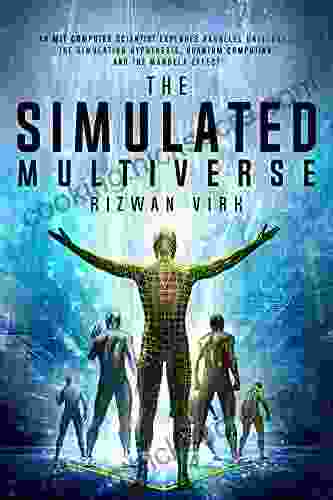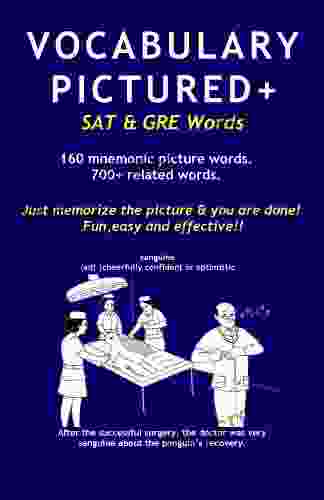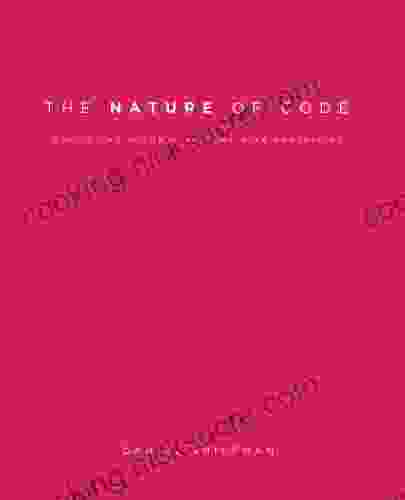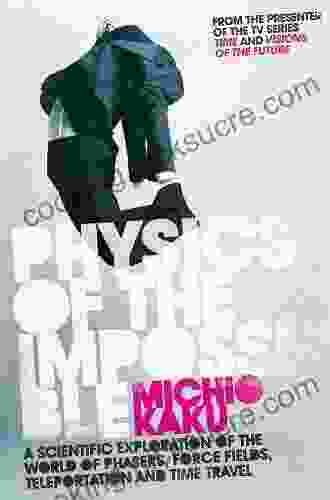An MIT Computer Scientist Explores Parallel Universes and the Simulation Hypothesis

The idea of parallel universes has been around for centuries. In the past, these ideas were often relegated to the realm of science fiction. However, in recent years, scientists have begun to take these ideas more seriously. One of the leading researchers in this area is Dr. Seth Lloyd, a computer scientist at MIT.
Dr. Lloyd's Work
Dr. Lloyd's work focuses on the possibility that we live in a simulated universe. This means that our entire reality is being created by a computer program. If this is the case, it would have profound implications for our understanding of the universe and our place in it.
4.6 out of 5
| Language | : | English |
| File size | : | 5667 KB |
| Text-to-Speech | : | Enabled |
| Screen Reader | : | Supported |
| Enhanced typesetting | : | Enabled |
| X-Ray | : | Enabled |
| Word Wise | : | Enabled |
| Print length | : | 512 pages |
| Lending | : | Enabled |
Dr. Lloyd's research is based on the idea that the universe is a quantum computer. Quantum computers are very different from traditional computers. Traditional computers store information in bits, which can be either 0 or 1. Quantum computers, on the other hand, store information in qubits, which can be 0, 1, or both at the same time.
Dr. Lloyd believes that the universe is a quantum computer and that we are living in a simulation that is being run on this computer. He believes that this simulation is being run by a more advanced civilization than our own.
Implications of the Simulation Hypothesis
If the simulation hypothesis is correct, it would have profound implications for our understanding of the universe and our place in it. First, it would mean that our reality is not as real as we think it is. We are living in a simulated world, and everything we experience is being created by a computer program.
Second, it would mean that we are not alone in the universe. There are other civilizations out there that are more advanced than our own. These civilizations may be running simulations of their own, and we may be living in one of these simulations.
Finally, it would mean that our future is not predetermined. The simulation that we are living in could be changed at any time. This means that we have the power to create our own future and to make the world a better place.
Is the Simulation Hypothesis Real?
The simulation hypothesis is a fascinating idea, but is it real? Dr. Lloyd believes that there is a strong possibility that we live in a simulated universe. However, he also admits that there is no way to prove this for sure.
Ultimately, the question of whether or not we live in a simulated universe is a question that can only be answered by future research. However, Dr. Lloyd's work has helped to bring this idea into the mainstream and has sparked a new wave of interest in the possibility of parallel universes.
The simulation hypothesis is a thought-provoking idea that has the potential to change our understanding of the universe and our place in it. If the simulation hypothesis is correct, it would mean that our reality is not as real as we think it is and that we are not alone in the universe. It would also mean that our future is not predetermined and that we have the power to create our own future.
Whether or not the simulation hypothesis is real is a question that can only be answered by future research. However, Dr. Lloyd's work has helped to bring this idea into the mainstream and has sparked a new wave of interest in the possibility of parallel universes.
4.6 out of 5
| Language | : | English |
| File size | : | 5667 KB |
| Text-to-Speech | : | Enabled |
| Screen Reader | : | Supported |
| Enhanced typesetting | : | Enabled |
| X-Ray | : | Enabled |
| Word Wise | : | Enabled |
| Print length | : | 512 pages |
| Lending | : | Enabled |
Do you want to contribute by writing guest posts on this blog?
Please contact us and send us a resume of previous articles that you have written.
 Fiction
Fiction Non Fiction
Non Fiction Romance
Romance Mystery
Mystery Thriller
Thriller SciFi
SciFi Fantasy
Fantasy Horror
Horror Biography
Biography Selfhelp
Selfhelp Business
Business History
History Classics
Classics Poetry
Poetry Childrens
Childrens Young Adult
Young Adult Educational
Educational Cooking
Cooking Travel
Travel Lifestyle
Lifestyle Spirituality
Spirituality Health
Health Fitness
Fitness Technology
Technology Science
Science Arts
Arts Crafts
Crafts DIY
DIY Gardening
Gardening Petcare
Petcare Wildlife Trusts
Wildlife Trusts Andrew St Pierre White
Andrew St Pierre White Michael Anderle
Michael Anderle Lilith Starr
Lilith Starr Benedict Carey
Benedict Carey Susanna Kearsley
Susanna Kearsley Jason Welker
Jason Welker Tim Wharnsby
Tim Wharnsby Jamie Ivey
Jamie Ivey James R Morrow Jr
James R Morrow Jr Annette Curtis Klause
Annette Curtis Klause Andrea Hudy
Andrea Hudy Dana Mccullough
Dana Mccullough Adam Mansbach
Adam Mansbach Deaver Brown
Deaver Brown Linda Anne Silvestri
Linda Anne Silvestri Greg Presto
Greg Presto Robert B Yonaitis
Robert B Yonaitis Richard N Aufmann
Richard N Aufmann Galen Wolf
Galen Wolf Paul Abell
Paul Abell Brian C Muraresku
Brian C Muraresku Andre Watson
Andre Watson Stephen Wiggins
Stephen Wiggins Erica Hoke
Erica Hoke George E P Box
George E P Box Tod Schimelpfenig
Tod Schimelpfenig John Gilbert
John Gilbert Riley Black
Riley Black Ewen Levick
Ewen Levick Christine Heppermann
Christine Heppermann Brad Schoenfeld
Brad Schoenfeld E K Johnston
E K Johnston Jenny Mackay
Jenny Mackay Jason Louv
Jason Louv Sid Thatte
Sid Thatte Christos Lynteris
Christos Lynteris Garcilaso De La Vega
Garcilaso De La Vega Rachel Meltzer Warren
Rachel Meltzer Warren Steven M Fiser
Steven M Fiser Walter Greiner
Walter Greiner Gabby Rivera
Gabby Rivera David Montgomery
David Montgomery Buster Benson
Buster Benson Bernard A Chavis
Bernard A Chavis Bisco Hatori
Bisco Hatori Ronald J Harshbarger
Ronald J Harshbarger Gregory Curtis
Gregory Curtis James Rebanks
James Rebanks Joe Posnanski
Joe Posnanski Kristen Thone
Kristen Thone Hampton Sides
Hampton Sides Connie J Wells
Connie J Wells Victoria Allman
Victoria Allman Cathal Armstrong
Cathal Armstrong Arlo Adams
Arlo Adams Rich Luhr
Rich Luhr Leslie Morgan Steiner
Leslie Morgan Steiner Roger Atwood
Roger Atwood Julie Miller
Julie Miller Vertamae Smart Grosvenor
Vertamae Smart Grosvenor Michele Leathers
Michele Leathers David Alloway
David Alloway Jimmy Elliott
Jimmy Elliott Ben Doughty
Ben Doughty James E Wisher
James E Wisher Tom Siegfried
Tom Siegfried Tony Herman
Tony Herman Wolfgang Hohlbein
Wolfgang Hohlbein Frances Evesham
Frances Evesham Dylan Norton
Dylan Norton Cliff Wilson
Cliff Wilson Carrie Ryan
Carrie Ryan Ralph Zuranski
Ralph Zuranski Sue Fierston
Sue Fierston Kristine Papin Morris
Kristine Papin Morris Dayton O Hyde
Dayton O Hyde Kenneth S Shultz
Kenneth S Shultz 18th Edition Kindle Edition
18th Edition Kindle Edition Chiara Marletto
Chiara Marletto Terry Ann Williams Richard
Terry Ann Williams Richard Tamara Ireland Stone
Tamara Ireland Stone Hayley Campbell
Hayley Campbell Roland Martin
Roland Martin William Gerin
William Gerin Michael Judge
Michael Judge Mike Davenport
Mike Davenport Mike Cyra
Mike Cyra Nathaniel Philbrick
Nathaniel Philbrick Janet Wolanin Alexander
Janet Wolanin Alexander Luke Hohmann
Luke Hohmann Steven J Matthiesen
Steven J Matthiesen Elizabeth Marshall Thomas
Elizabeth Marshall Thomas Kevin Cook
Kevin Cook Pete Pfitzinger
Pete Pfitzinger Tracy Townsend
Tracy Townsend Ken Gullette
Ken Gullette Seth Reichelson
Seth Reichelson Mason Deaver
Mason Deaver Susan Williams White
Susan Williams White Tom Lecompte
Tom Lecompte Marta Obiols Llistar
Marta Obiols Llistar Gillian Tett
Gillian Tett V E Schwab
V E Schwab Rita Jablonski
Rita Jablonski Kjartan Poskitt
Kjartan Poskitt Pietro Matracchi
Pietro Matracchi Shane Ryan
Shane Ryan Andy Bull
Andy Bull Kathryne Kennedy
Kathryne Kennedy Margaret Thorsborne
Margaret Thorsborne Zak Mt Standridge
Zak Mt Standridge Leigh Bardugo
Leigh Bardugo Department Of Defense
Department Of Defense Shaun Assael
Shaun Assael Paul Stamets
Paul Stamets Robin Hobb
Robin Hobb Elizabeth Clor
Elizabeth Clor Bruce Mcnall
Bruce Mcnall Mary Keith Piasecki
Mary Keith Piasecki Steven H Weintraub
Steven H Weintraub Frans De Waal
Frans De Waal Mary Jane Sterling
Mary Jane Sterling Michael Hermann
Michael Hermann Steven Poses
Steven Poses Thomas Watson
Thomas Watson Anne Holler
Anne Holler Bob Mayer
Bob Mayer Luigi Gabriele Conti
Luigi Gabriele Conti Rob Summers
Rob Summers David Abram
David Abram Kyle Keegan
Kyle Keegan Andrew Feinberg
Andrew Feinberg Bhavesh Mamtani
Bhavesh Mamtani Victoria Schwab
Victoria Schwab William F Sensakovic
William F Sensakovic Brenda Reed Pilcher
Brenda Reed Pilcher Laurie Seale
Laurie Seale Aldous Huxley
Aldous Huxley Karen Robson
Karen Robson Eugene Raikhel
Eugene Raikhel Gerald A Moore Sr
Gerald A Moore Sr Stephen Chbosky
Stephen Chbosky Ian Tattersall
Ian Tattersall Andrea Curtis
Andrea Curtis Paco Underhill
Paco Underhill Robert Hamill
Robert Hamill L Michele Issel
L Michele Issel Usa Pickleball Association
Usa Pickleball Association Gaurav Suri
Gaurav Suri Geoffrey Wolff
Geoffrey Wolff Jim Apfelbaum
Jim Apfelbaum Luke Rosiak
Luke Rosiak Christine Balaz
Christine Balaz Kerri Andrews
Kerri Andrews Lucia Ashta
Lucia Ashta Christian Keur
Christian Keur Pat Wray
Pat Wray Tom Lodziak
Tom Lodziak Katharine B Soper
Katharine B Soper Lori Shandle Fox
Lori Shandle Fox Lena Shev
Lena Shev Melissa Caughey
Melissa Caughey Rob Taylor
Rob Taylor Craig Custance
Craig Custance Rolf Potts
Rolf Potts Rizwan Virk
Rizwan Virk Kelly Tyler Lewis
Kelly Tyler Lewis Thomas S Kuhn
Thomas S Kuhn Andrew Doughty
Andrew Doughty Jeff Davis
Jeff Davis Sorin Dumitrascu
Sorin Dumitrascu Jason Zemcik
Jason Zemcik Lonely Planet
Lonely Planet Necoco
Necoco Martin Rooney
Martin Rooney Gwendolyn Griffith Lieuallen
Gwendolyn Griffith Lieuallen 24th Edition Kindle Edition
24th Edition Kindle Edition Robert Bacal
Robert Bacal Bill O Neill
Bill O Neill Karen Tranberg Hansen
Karen Tranberg Hansen Steven Arms
Steven Arms Robin Ha
Robin Ha Donna Bollinger
Donna Bollinger Arianna Astuni
Arianna Astuni Will Thornton
Will Thornton Stephan J Guyenet
Stephan J Guyenet Bettina Bonifatti
Bettina Bonifatti Jack Hunnicutt
Jack Hunnicutt Laird Hamilton
Laird Hamilton W J Hendry
W J Hendry Dr Gabriel Peter Salgo
Dr Gabriel Peter Salgo Jeremy Freese
Jeremy Freese Catherine Montgomery
Catherine Montgomery Andrew Beyer
Andrew Beyer Kylie Lee Baker
Kylie Lee Baker Jenn Brandt
Jenn Brandt Mira Kirshenbaum
Mira Kirshenbaum Mara Vorhees
Mara Vorhees Matt Fulks
Matt Fulks Mara Rockliff
Mara Rockliff Gary Thomas
Gary Thomas Linda Eyre
Linda Eyre D Harvey
D Harvey Andrew Blauner
Andrew Blauner Paulette F C Steeves
Paulette F C Steeves Metin Bektas
Metin Bektas James A Middleton
James A Middleton Steve Sheinkin
Steve Sheinkin Julie Powers
Julie Powers Sara Manning Peskin
Sara Manning Peskin Mark Mcconville
Mark Mcconville Mike Gauthier
Mike Gauthier Robin Satty
Robin Satty Jennifer Anne Davis
Jennifer Anne Davis Thomas Berger
Thomas Berger Charles Szypszak
Charles Szypszak Barbara Merry
Barbara Merry Keith Sutton
Keith Sutton Nic Oatridge
Nic Oatridge Brian Azzarello
Brian Azzarello Jay Annelli
Jay Annelli Rachel Hawkins
Rachel Hawkins Victoria Ortiz
Victoria Ortiz Lisa Bond
Lisa Bond Harriet Brown
Harriet Brown Peter Mcbride
Peter Mcbride Oliver Perkins
Oliver Perkins Leslie Vedder
Leslie Vedder Ola Ola
Ola Ola Steve Caplin
Steve Caplin Jay Greeson
Jay Greeson Ryan Pellett
Ryan Pellett Mark M Meerschaert
Mark M Meerschaert Joseph Ledoux
Joseph Ledoux C L Mississippi Morgan
C L Mississippi Morgan Kiersten White
Kiersten White Chris Mcmullen
Chris Mcmullen H Spencer Lewis
H Spencer Lewis Marvin L Bittinger
Marvin L Bittinger Sameera Khan Rd Pa C
Sameera Khan Rd Pa C Suzy Ashworth
Suzy Ashworth Sheila Jasanoff
Sheila Jasanoff Peter David
Peter David Nick Peters
Nick Peters Nikola Tesla
Nikola Tesla Jonathan Clements
Jonathan Clements Paul Kalas
Paul Kalas Steve Scott
Steve Scott Andrew Duncan
Andrew Duncan Sudhir Shirwadkar
Sudhir Shirwadkar Marta Szabo
Marta Szabo Jessica Mccrory Calarco
Jessica Mccrory Calarco Jed Z Buchwald
Jed Z Buchwald James Branch Cabell
James Branch Cabell Mark Hume
Mark Hume Joelle Charbonneau
Joelle Charbonneau Jefferson Hawkins
Jefferson Hawkins Wendy Heard
Wendy Heard Namina Forna
Namina Forna Andrew Brown
Andrew Brown Carmen Micsa
Carmen Micsa Melissa Reynolds
Melissa Reynolds Richard Bolstad
Richard Bolstad Sarah Outen
Sarah Outen Leslie Sokol
Leslie Sokol Pliny The Elder
Pliny The Elder Joseph Bruchac
Joseph Bruchac Denise Riebe
Denise Riebe Gabrielle Coleman
Gabrielle Coleman Joseph Luzzi
Joseph Luzzi Marissa Meyer
Marissa Meyer Kristin Briney
Kristin Briney Chris Lilly
Chris Lilly Brock Eide
Brock Eide Kindra Gordon
Kindra Gordon Andrea Olson
Andrea Olson Anne Marie Meyer
Anne Marie Meyer Hasok Chang
Hasok Chang Robert Jay Lifton
Robert Jay Lifton Tillie Walden
Tillie Walden Galit Shmueli
Galit Shmueli Timothy Johnson
Timothy Johnson David W Brown
David W Brown Jennifer L Armentrout
Jennifer L Armentrout Claire Maxted
Claire Maxted Kailin Gow
Kailin Gow Robin Mamlet
Robin Mamlet Samantha Rodman
Samantha Rodman Josh Tabor
Josh Tabor Stacey Little
Stacey Little Jonathan Cummings
Jonathan Cummings Course Hero
Course Hero J E Lendon
J E Lendon Loren Pope
Loren Pope Bobby Orr
Bobby Orr Jacqueline Edmondson
Jacqueline Edmondson Lauren Daniels
Lauren Daniels Jennifer Blair
Jennifer Blair Giada De Laurentiis
Giada De Laurentiis Matt Richtel
Matt Richtel David Borgenicht
David Borgenicht Marcus A Pfeiffer
Marcus A Pfeiffer Neil Oliver
Neil Oliver Charles H Hapgood
Charles H Hapgood C B Lee
C B Lee Marcus Felson
Marcus Felson Jenna Miscavige Hill
Jenna Miscavige Hill Eric Engle
Eric Engle Anne Bogel
Anne Bogel Whitney Nelson
Whitney Nelson Elizabeth S Trafalgar
Elizabeth S Trafalgar Patrick Mouratoglou
Patrick Mouratoglou James Willstrop
James Willstrop Jack Purdum
Jack Purdum Sean Pidgeon
Sean Pidgeon Daniel Shiffman
Daniel Shiffman Jordan Romero
Jordan Romero Laura Domino
Laura Domino Michael T Nygard
Michael T Nygard Andrej Spec
Andrej Spec Stephanie Cacioppo
Stephanie Cacioppo Richard Bellman
Richard Bellman Joseph Terry
Joseph Terry Jim Shea
Jim Shea Anna Holmwood
Anna Holmwood Rick Heard
Rick Heard Meiso
Meiso Antonio Iturbe
Antonio Iturbe Robert Sky Allen Ph D
Robert Sky Allen Ph D George Christian Pappas
George Christian Pappas Patrick W Galbraith
Patrick W Galbraith Baz Thompson
Baz Thompson Christopher Sommer
Christopher Sommer Rick Westhead
Rick Westhead Ed Willes
Ed Willes Clayton Everline
Clayton Everline Roberto Pedreira
Roberto Pedreira Donald S Murray
Donald S Murray Hugh Raffles
Hugh Raffles Nancy Mather
Nancy Mather Jen Calonita
Jen Calonita Ruby Walker
Ruby Walker Joe Wells
Joe Wells Ben Orlin
Ben Orlin Jaak Panksepp
Jaak Panksepp Mandy Baggot
Mandy Baggot Andrea Flores
Andrea Flores Terence Callery
Terence Callery Jim Curran
Jim Curran Big Daddy Ozone
Big Daddy Ozone Andrew Greiner
Andrew Greiner Maria Konnikova
Maria Konnikova Rashers Tierney
Rashers Tierney Arous Brocken
Arous Brocken Stuart L Kaplan M D
Stuart L Kaplan M D Ronald D Davis
Ronald D Davis M D Johnson
M D Johnson S Fatou
S Fatou Rajani Katta
Rajani Katta Lynne L Finch
Lynne L Finch John Ramirez
John Ramirez Patsy M Lightbown
Patsy M Lightbown Ivan Pastine
Ivan Pastine Michio Kaku
Michio Kaku Erich Neumann
Erich Neumann James Dodson
James Dodson Elizabeth S Meckes
Elizabeth S Meckes Daniel P Murphy
Daniel P Murphy Thomas Meyer
Thomas Meyer Joe Cavallaro
Joe Cavallaro Michael S Malone
Michael S Malone Doug Swisher
Doug Swisher Bonita Norris
Bonita Norris Nancy B Rapoport
Nancy B Rapoport Morihei Ueshiba
Morihei Ueshiba Charlotte Elkins
Charlotte Elkins Guillermo Ferrara
Guillermo Ferrara Rachael Chapman
Rachael Chapman Steve Bisheff
Steve Bisheff Tim Ryan
Tim Ryan Raymond Coppinger
Raymond Coppinger Nancy Mcwilliams
Nancy Mcwilliams Nick Marshall
Nick Marshall Trish Allison
Trish Allison Milo Stewart
Milo Stewart James Geary
James Geary Dorothy Pang
Dorothy Pang Richard P Feynman
Richard P Feynman Andrea Bemis
Andrea Bemis Christina Kim
Christina Kim Isabel Sterling
Isabel Sterling Bernard Moitessier
Bernard Moitessier Robert H Miller
Robert H Miller Peter Boardman
Peter Boardman James Fox
James Fox Steven Johnson
Steven Johnson Chris Salisbury
Chris Salisbury Ken Blanchard
Ken Blanchard J David Logan
J David Logan Noel Janis Norton
Noel Janis Norton Bernard Craw
Bernard Craw Joey Miller Msw Lcsw
Joey Miller Msw Lcsw Catie Czora
Catie Czora C L Werner
C L Werner John Morton
John Morton Becky Lomax
Becky Lomax Ian O Connor
Ian O Connor Sarah Castille
Sarah Castille Ann Gadzikowski
Ann Gadzikowski Malinda Lo
Malinda Lo Andrea Gonzales
Andrea Gonzales Paul Rooyackers
Paul Rooyackers Kelly Oliver
Kelly Oliver Richard Heinberg
Richard Heinberg Bruce D Perry
Bruce D Perry Francesca Zappia
Francesca Zappia Jakub Marian
Jakub Marian Lundy Bancroft
Lundy Bancroft Stan Tekiela
Stan Tekiela Rashid Khalidi
Rashid Khalidi Rupert Sheldrake
Rupert Sheldrake Leisy J Abrego
Leisy J Abrego Lars Muhl
Lars Muhl David Scott
David Scott Sandy Stott
Sandy Stott Bridget Portmann
Bridget Portmann Rachel Atwood
Rachel Atwood Andrea Cataldo
Andrea Cataldo Gemma Rogers
Gemma Rogers Brandon Mull
Brandon Mull James Turnbull
James Turnbull James Mallory
James Mallory Jon Gillespie Brown
Jon Gillespie Brown Simon Garfield
Simon Garfield Andrew Gelman
Andrew Gelman Andrea Wachter
Andrea Wachter George Hospodar
George Hospodar Dani Jacobs
Dani Jacobs Caren Van Slyke
Caren Van Slyke Candace Clark Trinchieri
Candace Clark Trinchieri Florent Buisson
Florent Buisson Greg Ruth
Greg Ruth Andrew Goliszek
Andrew Goliszek Sunny Anderson
Sunny Anderson Vin T Sparano
Vin T Sparano Sandra Glosser
Sandra Glosser Emily Henry
Emily Henry Minal Hajratwala
Minal Hajratwala Serena Valentino
Serena Valentino George Mahood
George Mahood Daniel Humm
Daniel Humm James Lyons Weiler
James Lyons Weiler Kelsie Stelting
Kelsie Stelting Robyn Sheldon
Robyn Sheldon Peter May
Peter May Raymond E Feist
Raymond E Feist Andrea Cremer
Andrea Cremer Peter Scazzero
Peter Scazzero Dot Edu
Dot Edu Ricky Moore
Ricky Moore Ronald W Doerfler
Ronald W Doerfler Andrea Komlosy
Andrea Komlosy Romney Steele
Romney Steele Richard Munson
Richard Munson John Bantin
John Bantin Prasad Raju V V N R Pathapati
Prasad Raju V V N R Pathapati Laura Lincoln Maitland
Laura Lincoln Maitland A J Carlisle
A J Carlisle Laurie Ann Thompson
Laurie Ann Thompson April Vahle Hamel
April Vahle Hamel Kathleen Dean Moore
Kathleen Dean Moore Steve Anthony Tallon
Steve Anthony Tallon Richard Maury
Richard Maury Bruce Bowlen
Bruce Bowlen William Ritter
William Ritter Patrick Hatt
Patrick Hatt Future Publishing
Future Publishing Kirby Arnold
Kirby Arnold
Light bulbAdvertise smarter! Our strategic ad space ensures maximum exposure. Reserve your spot today!

 Aldous HuxleyMastering GRE Reading Comprehension Essays with Manhattan Prep's Strategy...
Aldous HuxleyMastering GRE Reading Comprehension Essays with Manhattan Prep's Strategy...
 Juan RulfoAdvice and Knowledge from Tee to Green: 1001 Pearls of Wisdom for Golfers of...
Juan RulfoAdvice and Knowledge from Tee to Green: 1001 Pearls of Wisdom for Golfers of... Geoffrey BlairFollow ·19.1k
Geoffrey BlairFollow ·19.1k Andres CarterFollow ·13k
Andres CarterFollow ·13k Braden WardFollow ·9.6k
Braden WardFollow ·9.6k Clay PowellFollow ·5.5k
Clay PowellFollow ·5.5k Vince HayesFollow ·8.4k
Vince HayesFollow ·8.4k Cody BlairFollow ·2.9k
Cody BlairFollow ·2.9k Andy HayesFollow ·9.3k
Andy HayesFollow ·9.3k Yukio MishimaFollow ·4.8k
Yukio MishimaFollow ·4.8k

 Demetrius Carter
Demetrius CarterGolf Scrimmages: Realistic Practice Games Under Pressure
Golf scrimmages are...

 Andres Carter
Andres CarterAhsoka Tano: The Force-Wielding Togruta Who Shaped the...
Ahsoka Tano is one of the most...

 Greg Foster
Greg FosterUndeath Ascendant: A Blood-Soaked Literary Odyssey into...
Immerse yourself in a macabre tapestry of...
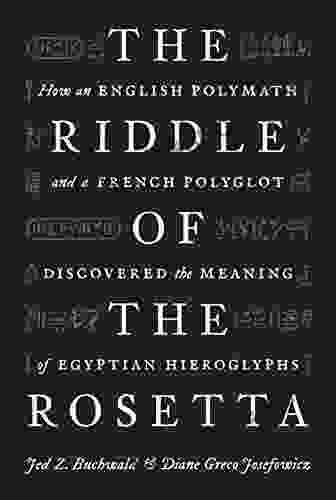
 Paulo Coelho
Paulo CoelhoHow an English Polymath and French Polyglot Discovered...
The Rosetta Stone is...
4.6 out of 5
| Language | : | English |
| File size | : | 5667 KB |
| Text-to-Speech | : | Enabled |
| Screen Reader | : | Supported |
| Enhanced typesetting | : | Enabled |
| X-Ray | : | Enabled |
| Word Wise | : | Enabled |
| Print length | : | 512 pages |
| Lending | : | Enabled |


